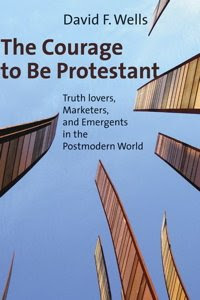Another One Bites the Dust
 I finally finished reading David Wells’ latest book, The Courage to Be Protestant: Truth-lovers, Marketers, and Emergents in the Postmodern World. It is a good and eye-opening assessment of the Evangelical movement as it stands today. In a nutshell, Wells argues that the Evangelical movement has given up on truth and that this has grievous consequences.
I finally finished reading David Wells’ latest book, The Courage to Be Protestant: Truth-lovers, Marketers, and Emergents in the Postmodern World. It is a good and eye-opening assessment of the Evangelical movement as it stands today. In a nutshell, Wells argues that the Evangelical movement has given up on truth and that this has grievous consequences.
Wells began writing the book as a summary of four previous books: No Place For Truth, God in the Wasteland, Losing Our Virtue, and Above All Earthly Pow’rs. But it has taken on an identity of its own above and beyond its usefulness as a summary of the previous provocative and salutary volumes.
The book points out that classical Evangelicalism was built on a minimal consensus so that Christian groups from disparate traditions could come together in mostly parachurch settings where doctrinal specifics would be ignored. The problem with this is that, as Wells points out, doctrine shrinks and the church vanishes. There is little doubt that these outcomes were not intended by the original founders of what has been called “neo-Evangelicalism.” Men like Carl F. H. Henry and Harold John Ockenga were not disinterested in doctrine. But the result of trying to create a coalition of various Christian traditions built around certain specific and minimal doctrines had the deletarious effect of suggesting that the doctrines not stressed were not important. And due to the context in which this happened (the defection of the old mainline denominations from the gospel) there was a tendency to disparage the church. So we find ourselves in a setting where we either replace the gospel with marketing strategies (as if the church depended upon attracting consumers) or eclecticism (where we do not really care whether we pick and choose from conflicting traditions as long as what we choose suits our taste) and in a place where the church can now be jettisoned for the practice of personal spirituality (ala the revoluntionary insights of George Barna).
What have we learned from all this? There are many things that could be said. But I will keep to these two things: doctrine matters and the church does too! What we believe and where we profess it and live it out matters a great deal. For instance, whether we embrace the Jesus of Scripture and the Reformed confessions or the Jesus of Momonism is a significant matter effecting one’s eternal destiny. And when we trust in Christ for our salvation we are joined to him and to his church. That theological fact must be evidenced in membership and involvement in a local congregation.
I could go on, but I will stop here. I am truly thankful that the gospel actually has content which we must believe and that when we come to faith in Christ we are not left to ourselves to live out the Christian faith. David Wells has reminded us of these things and many others.
* The Courage to Be Protestant was published by Eerdmans in 2008.


